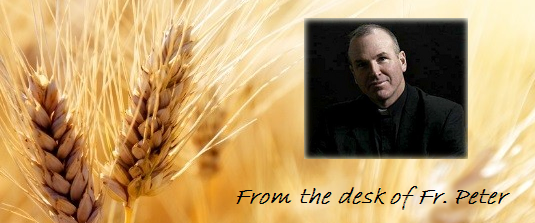May the grace of Christ fill your hearts and minds!
This week the Church celebrates the Solemnity of All Saints. I have held this feast in special regard for as long as I can remember. I suppose that it is because this occasion brings with it a special sense of the spiritual world to which we know we are connected. Maybe it’s just me but it seems like most of the time, our conversations and spiritual awareness reflect a two dimensional plane of the relationship between God and ourselves who are still striving to live Christian lives in the world. But on the Solemnity of All Saints and then the Feast of All Souls we are drawn more deeply into the reality of the Church in fuller dimension which includes the Church Triumphant, the Church Suffering, and the Church Militant.
The Church Triumphant refers to those souls who have gained heaven’s glory, whether canonized Saints or not. They are the faithful members of our family of faith that have died and gone before us. They may be members of our own families and relatives or friends who are worthy of honor and respect as examples of Christian living to be emulated. They are also Saints who pray for us and help us on our pilgrimage from time to eternity. There are innumerable examples and stories of the aid given through the intercession of Saints. I am certain that you are able to share a story or two yourself!
The Church Suffering refers to those souls in purgatory who have died in the state of grace but have not yet reached perfection. These souls make expiation for their un-forgiven venial sins or for the temporal punishment due to venial and mortal sins that have already been forgiven. They are assisted by the prayers and sacrifices we offer on their behalf. This is very important. In fact, the Church includes a petition for them in every Eucharistic Prayer of the Mass. St. Pius of Pietrelcina is an example of someone deeply devoted to offering prayers and sacrifices so that souls in purgatory would be freed from suffering purification to enter heaven.
The Church Militant refers to ourselves who are still on pilgrimage and today is a special opportunity for us to reflect on God’s plan of salvation for all. We each have a part to play in it for ourselves and others. God rejoices in giving us aid through the Saints we turn to for help. Think of those who have helped you and say “thank you” to those who have been and will be there to help you on the way. May God bless you all! +++ Fr Peter

